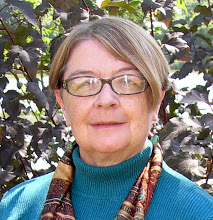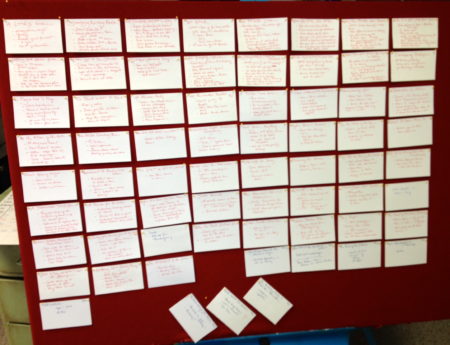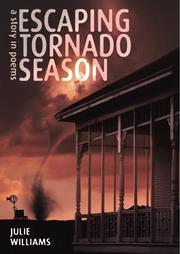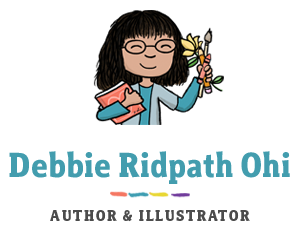
Thanks to Julie Williams (@JulieKWms2013) for being the 23,000th person to follow my @inkyelbows Twitter account! Julie is the author of two YA books. ESCAPING TORNADO SEASON: A Story In Poems (HarperCollins, 2004) is a novel in verse. IT’S NOT THE END OF THE WORLD (title may change) will come out from Macmillan/Roaring Brook Press in 2013 or 2014. She’s repped by Jill Corcoran of the Herman Agency, Inc.
As I started checking out her blog, I discovered that Julie is not only a published author but also an artist. When she’s not writing, she’s likely to be in her studio up to her ears in paint, glue, markers, fabric, paper, old photos, beads, sticks, driftwood, stones, vintage books, lace and hardware — all used to create her mixed media works.
Check out her gorgeous “Mardi-Gras Me-Dusa” piece, which was chosen for the cover of the Minnesota Women’s Press magazine a while back:

The piece is a mixed media fiber art collage: fabric, fusible interfacing, thread, ribbon, beads, Lumiere acrylic paint, ribbon. Stitching was done by both hand and machine.
Q. What is your writing process?
I’m an avid journal keeper. I write first thing every morning no matter what and have been doing that for many years. When I’m working on a book, my journal becomes a place to try out all the WHAT IFs of my characters and story line. Almost all my back story writing happens in the journal first. Starting my day with the journal is the most constant part of my writing routine. In the early stages of a novel (you know, like the first THREE drafts) I write mostly in the mornings and only about 2 or 3 hours a day. I usually write about five days a week. Later, when I’m bringing the story home (like rewrites FOUR and FIVE) I become pretty obsessed and write for 5 or 6 hours a day or even longer and seven days a week. I wake, sleep, dream, eat and journal journal journal the book. That’s where I am right now with what I hope is the final revision of IT’S NOT THE END OF THE WORLD.
Whenever I get stuck in my writing (and I do get stuck, especially on a big project), I either let it sit and do artwork for a couple days, or I apply the visual work to the book project itself. What works for me: I make many charts and calendars and flip charts and story boards. Sometimes I even draw maps and do collages and make character paper dolls. Anything that helps me to not only track the characters and plot lines, but to flesh them out and make them dimensional. Whenever I take the time to do one or more of these things, the writing always flows again.

ESCAPING TORNADO SEASON is a novel in verse and it began with poems I’d written about my family and abo
t growing up in Northern Minnesota and Nebraska. I wrote over a hundred new poems in order to create the story of Allie. It was an exciting process because I discovered that the more fictional the story line and characters became, the more they revealed the emotional truth I’d been searching for in my original writing. IT’S NOT THE END OF THE WORLD is different in two big ways — it’s in a more traditional prose form and it’s not nearly as autobiographical. But my inspiration for the book does come from the years I spent in the theatre here in the Midwest and from my wildly diverse and nontraditional family.

Q. What advice do you have for aspiring writers?
Do it because you love it, because if you don’t write your head will explode.
Develop rituals that work for you — like writing in a journal first thing in the morning (or right before you go to bed at night). Let the other parts of your life inform your writing and your writing rituals. When I was working on an earlier draft of IT’S NOT THE END OF THE WORLD, I created a Director’s Book inspired by my graduate study in Acting and Directing. And then when that wasn’t giving me what I needed, I went back into it and added visual images to help capture things I might have missed about the characters and about their dreams and wants and needs and desires. When I was in the theatre I never dreamed I’d use those skills to write a book. No matter what “other life” you’ve led or are still leading — mine it for your writing!
Read what you write out loud. And then, when you’re too close to what you’ve written — have someone else read it out loud to you so you can hear how someone else is receiving your words. That second one is a lot scarier than the first, but it is a pretty powerful tool. This revision I’ve done a lot of interviews with my main character (again, in my journal) and I’m always surprised what Jessie has to tell me when I get out of my own way.
I’ve been very fortunate to have one or two “first readers” that I love and trust. I think they encourage me to continue writing more than anyone or anything else.
Hook up with great organizations like the Society of Children’s Book Writers and Illustrators (SCBWI) and Sisters in Crime (SinC) where you can meet other people who write so their heads won’t explode. I’m not a big group person myself (like a lot of creative people I tend to be a loner who needs a LOT of solitude). What helped me get over that obstacle was to volunteer to help at events and conferences and workshops and that led to many years of fruitful contacts and teaching opportunities. I met my first editor at an SCBWI retreat. My agent and I were in a writing group together when I lived in Southern California. Here in Minnesota I know if I show up at The Loft for a reading or a class or a workshop, I’ll go away enriched and quite possibly with a new writing friend.
Facebook and Twitter (I’m just starting this!) and web sites and blogs, oh my! They work. I’m still learning about all of this and parts of it I love and parts of it I don’t love so much. What I do love is meeting new people in a virtual way. I forget to check FB and twitter, so I set it up to receive everything in my email. This would make many people crazy but I love it. I’d rather delete what I don’t want to read than miss something important.
Laugh a lot. Cry a lot. Listen hard. And keep writing so your head won’t explode.
Q. I saw your gorgeous Mardi-Gras Me-Dusa piece. Have you ever combined your writing and artistic talents for any book projects?
I’m so glad you liked Mardi-Gras Me-Dusa. I had a lot of fun doing that fabric art collage and was really pleased when it was chosen for the cover of the November 2011 issue of Minnesota Women’s Press magazine (e-edition and paper copy). I haven’t combined the writing and artwork (in a finished product kind of way) yet, but would love to do that in a creative nonfiction/memoir piece. I’m really drawn to hybrid forms in both fiction and nonfiction. They are, as I’m sure you know, harder to sell. I am using some of my poems and other journal writings in my collages right now and am excited about the possibilities.
Q. What are you working on now? Any other upcoming events or other info you’d like to share?
I’m totally engrossed in what I hope is the last big rewrite of IT’S NOT THE END OF THE WORLD. By the time I finish the book, it will also have a new title!
Where you can find more info about Julie:
Julie Williams gallery at MNArtists.org
On Twitter: @JulieKWms2013
For more insights from book creators, see my Inkygirl Interview Archives and Advice For Young Writers And Illustrators From Book Creators.

